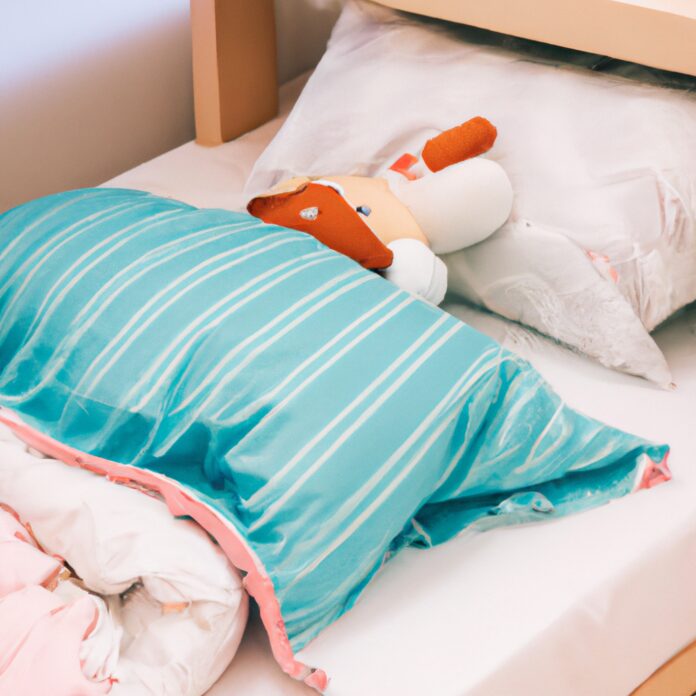Sleeping soundly is essential for a child’s physical, mental, and emotional development. Moreover, sleep deprivation can make your child cranky, affect how well they focus in school, or even impact their ability to form relationships. Establishing a good sleep routine can be difficult, but creating a comfortable sleep environment is an important part of promoting healthy sleep hygiene for your child. In this article, we will explore how to create a place for your child that promotes sound sleep, so they can stay healthy and happy.
1. Unlocking the Secrets of a Better Night’s Sleep
Sleeping better can bring a great many benefits. It can boost your mood, energy, productivity and overall wellbeing. can be the key to unlocking a better life. Here are easy tips to get started on your journey toward better sleep:
- Stick to a schedule. It’s important to wake up and go to bed at the same time each day, even on weekends. This helps establish a regular sleep schedule and can vastly improve the quality of your sleep.
- Exercise regularly. Having a consistent exercise routine can not only help you get fit and stay healthy, but also help bring an improved quality of sleep. Aim to be active for at least 30 minutes a day; it can make a huge difference.
- Eliminate distractions. It can be hard to sleep when you’re trying to focus on what’s happening around you. Minimizing noise, light, and other distractions before bed can create better quality sleep.
- Save the bed for sleep. Watching TV, using your phone, or doing work in bed can have a negative effect on your sleep quality. If possible, try to limit distractions and activities in bed so that your brain learns to associate the bedroom with sleep.
With the right environment and attitude, you can easily adopt healthy sleeping patterns for a better night’s rest. Setting goals, practicing good sleep hygiene, and understanding why you aren’t sleeping well can help you get on the path to unlocking those sleep secrets and living a healthier life.
2. Creating the Perfect Sleep Environment for Kids
A good sleep environment is essential for helping kids get the recommended amount of sleep each night. requires more than just a comfy bed.
Temperature: Kids are more sensitive to temperature than adults, and their bedrooms need to be around 65°F for optimal sleep quality. Adjusting the thermostat or considering a temperature-controlled mattress can help ensure an ideal temperature for sleeping.
Light Control: Darkness is important for promoting healthy sleep for both children and adults. Lined curtains, blinds, or blackout shades will help create the darkness that allows children to sleep soundly. If the darkness isn’t quite enough, consider a sleep mask or an eye pillow to encourage more restful sleep.
Computer and TV-free Zone: As tempting as it may be to let the kids watch TV or play computer games before bed, the artificial light from screens can make it harder to fall asleep. Establishing rules of no screens in the bedroom can help create a healthier sleep environment.
Furniture Options: Having furniture that is designed for a child’s bedroom helps create a relaxing and comfortable atmosphere. Features like a bean bag chair, playhouse bed, or hanging chairs can provide fun and interest while promoting relaxation and creativity.
Noise Control: White noise such as a fan, air purifier, or calming music can help block out loud sounds and distractions. Noise-canceling curtains can also help keep the bedroom free of intrusive sounds.
3. Critical Steps to Promote Sleep Hygiene
Sleep hygiene is essential for a healthy lifestyle. However, many of us fail to get quality sleep despite investing time and effort in doing so. If that’s the case with you, here are some critical steps to promote good sleep hygiene:
- Set up a sleeping schedule: Sticking to a sleeping schedule is necessary for better sleeping habits. Go to sleep and wake up at the same time every day.
- Get organized: Making changes in the living room like keeping the bed neat and tidy can help. Avoid working from the bed. Move away all the work-related tasks and gadgets from the bed.
Moreover, you should also manipulate your sleeping environment to promote better sleep. Here’s what you can do:
- Reduce noise, light, and temperatures: Keep the bedroom dark, quiet, and cool. A room temperature between 15 and 20 degrees Celsius is ideal.
- Reduce the screen time: Stay away from bright devices like your PC, laptop, and phone before you hit the bed. The blue light from the screen will make it harder for you to sleep.
By following these steps, you can promote better sleep hygiene. Prolonged sleep deprivation can lead to some serious consequences and good sleep hygiene can save you from that.
4. Examining the Benefits of a Quality Slumber
It’s time to look at the multitude of benefits a good night’s sleep can bring. Getting the sleep your body needs to perform to the best of its ability helps with physical, mental, and emotional wellbeing. Here are just some perks of hitting the hay on time:
- Reduced Stress: Anxiety and stress can be inhibited by getting enough sleep, helping your body rest and reset for the following day.
- Better Memory: Sleeping gives your brain the time to process important information, leading to better retention of facts, figures, and ideas.
- Improved Learning: When your brain is not bogged down and tired from lack of sleep, you’re more likely to think creatively and absorb new topics faster.
- Better Health: Sleep boosts your immune system, making it easier to fight off illnesses such as the flu and common cold. Quality rest also lowers the risk of developing chronic medical conditions.
Quality sleep is essential for all aspects of life. Dedicating time and effort to get an adequate amount of sleep has plenty of benefits. Whether it’s for physical or mental well-being, having enough rest is the key to healthy living.
5. Taking Control of Sleep Health Habits
Sleep is the pillar of an overall healthy lifestyle. Harvesting its benefits is vital for general wellbeing. Taking charge of your sleep health, however, isn’t as easy as it sounds. Following a few healthy habits coupled with strategies can give you better control over your sleep:
- Get accustomed to sleeping and waking up at the same time every day: Regularly sticking to your sleep and wake-up times reinforces your body’s clock and can help regulate sleep-wake cycles.
- Make your bedroom conducive to sleep: A bedroom with optimal temperature, darkness and minimum disturbances can set you up for a good night’s sleep. Keep the space organised, clear clutter and remove electronic gadgets such as laptops, phones, and tv.
- Block out noise and light: Your body clock is sensitive to light-dark cycles and disruptions. Investing in blackout curtains and a noise machine can help block out unwanted distractions.
- Take a break from caffeine: Stimulants such as caffeine and nicotine can lead to sleep deprivation if taken close to bedtime. Making a habit of avoiding caffeine within 6 hours of going to bed should help keep it at bay.
Discovering the root cause of your sleep deprivation is key in taking control of your sleep health. Keeping a tracker of your sleep patterns and lifestyle habits helps identify the culprits. If the problem persists, don’t hesitate to take professional help.
Incorporating lifestyle habits and strategies that works with your sleep helps restore balance to your sleep-wake cycles and live a more fulfilling life.
Who knew that the key to getting your kids a good night’s sleep was so simple? By following the sleep hygiene tips outlined here, you can implement healthy sleep habits with ease. The result? A peaceful bedroom oasis. Sweet dreams!





